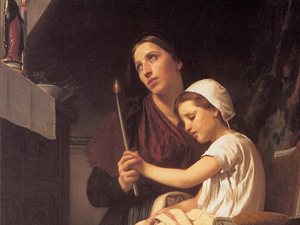The School of the Family
 It’s always painful to read a book that makes you feel like you have failed/are failing in every way that truly matters. That doesn’t mean you shouldn’t read it. I felt that way after reading School of the Family by Chantal R. Howard.
It’s always painful to read a book that makes you feel like you have failed/are failing in every way that truly matters. That doesn’t mean you shouldn’t read it. I felt that way after reading School of the Family by Chantal R. Howard.
Howard has had an eventful life. Although still only in her twenties, she was homeschooled from 4th through 12th grade, trained and competed as a high-level gymnast, lost her father as a young teenager, traveled many places, discerned a religious vocation, married theologian Peter Howard, S.T.D. , and has given birth to four children whom she is now homeschooling. Her story is truly fascinating and she tells it well and with an honest heart. She obviously experienced her share of challenges and heartache especially in the death of her father at such a young age. However, she also seems to have been greatly protected from many of the usual challenges most young people face. Her life was amazingly centered on God from a young age and she never deviated from the path. In that, she was truly blessed.
The purpose of The School of the Family is to emphasize the role of the family in the formation of children, especially their faith formation. While much of the book is about her own experiences and what they have taught her, the last chapter provides a “Family Rule” intended as a roadmap for how to live as a Catholic family. As Howard states, “My own experience has led me to the conclusion that adopting a rule of life is necessary to keep our lives ordered to the spiritual goals we wish to achieve. So, too, the family needs the support of such a rule of live in order to help fortify our efforts as we seek to live the school of the family. What follows is the apex of all that I have shared thus far, highlighting what such a rule should embody through the authority of the Church and the saints of our day.”
What Howard sets forth is truly the ideal. It presumes a family in which all members have a single minded purpose and focus on getting to heaven. It encourages frequent attendance at Mass as well as a weekly holy hour set aside for prayer and adoration, dedicating one’s life to Mary, saying a family rosary and reading the Word of God daily. It creates an environment in which prayer should be the first priority of daily life. It also requires simplicity and detachment from worldly goods.
Howard also provides special guidelines for husbands and wives and children. Her “Rule of Life for Children” is especially interesting. There is a tendency not to take children’s spiritual lives as seriously as we should. There have been several saints who were children and children are called to holiness just as much as those of us further along life’s journey. Howard emphasizes the need for obedience, daily prayer, penance, love of Scripture and of Mary, and adherence to the Ten Commandments.
So, then, what can those of us who fall far short of this ideal learn from Howard’s book? First of all, it is always good to have something to strive for. Yes, we are imperfect. We are going to come up short. Yet, the life Howard encourages is the one encouraged by the Church. I would suggest that the struggling Catholic family aim to incorporate one or two of her suggestions into their lives. Every step toward God is a step in the right direction. When those efforts become habits, then more steps can be added.
I think that it is also important to realize that, with the help of God, imperfect parents can still do a good job of bringing up their children. Howard’s parents were far from perfect, yet she obviously developed a deep love of God and her faith. She states that she learned from their mistakes. We do the best we can on this parenting journey, but it is a fact of life that we are going to screw up. We can hope and pray that God helps our children learn from our mistakes as well.
Our families are schools whether we ever thought of them in that way or not. Children learn much from how our lives are lived – both our actions and our words. They learn from our life of prayer or lack thereof, our commitment to, or disregard of Church teachings. What messages do we want to send our children? If our family school is not imparting the lessons we desire, The School of the Family by Chantal Howard can offer a starting point for some corrective action.
To learn more about “The School of the Family,” please visit www.schoolofthefamily.com.

